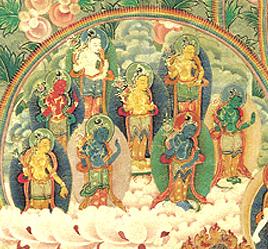Six paramitas: Difference between revisions
Jump to navigation
Jump to search
mNo edit summary |
mNo edit summary |
||
| Line 4: | Line 4: | ||
#[[Generosity]] (Skt. ''dāna''; Tib. [[སྦྱིན་པ་]], ''jinpa''): to cultivate the attitude of generosity. | #[[Generosity]] (Skt. ''dāna''; Tib. [[སྦྱིན་པ་]], ''jinpa''): to cultivate the attitude of generosity. | ||
#[[Discipline]] (Skt. ''śīla''; Tib. [[ཚུལ་ཁྲིམས་]], ''tsultrim''): refraining from harm. | #[[Discipline]] (Skt. ''śīla''; Tib. [[ཚུལ་ཁྲིམས་]], ''tsultrim''): refraining from harm. | ||
#[[Patience]] (Skt. ''kṣānti''; Tib. བཟོད་པ་, ''zöpa''): the ability not to be perturbed by anything. | #[[Patience]] (Skt. ''kṣānti''; Tib. [[བཟོད་པ་]], ''zöpa''): the ability not to be perturbed by anything. | ||
#[[Diligence]] (Skt. ''vīrya''; Tib. [[བརྩོན་འགྲུས་]], ''tsöndrü''): to find joy in what is virtuous, positive or wholesome. | #[[Diligence]] (Skt. ''vīrya''; Tib. [[བརྩོན་འགྲུས་]], ''tsöndrü''): to find joy in what is virtuous, positive or wholesome. | ||
#[[Meditative concentration]] (Skt. ''dhyāna''; Tib. [[བསམ་གཏན་]], ''samten''): not to be distracted. | #[[Meditative concentration]] (Skt. ''dhyāna''; Tib. [[བསམ་གཏན་]], ''samten''): not to be distracted. | ||
Revision as of 14:06, 8 April 2011

The six paramitas or 'transcendent perfections' (Skt. ṣaṭpāramitā; Tib. ཕ་རོལ་ཏུ་ཕྱིན་པ་དྲུག་, parol tu chinpa druk; Wyl. pha rol tu phyin pa drug) comprise the training of a bodhisattva, which is bodhichitta in action.
- Generosity (Skt. dāna; Tib. སྦྱིན་པ་, jinpa): to cultivate the attitude of generosity.
- Discipline (Skt. śīla; Tib. ཚུལ་ཁྲིམས་, tsultrim): refraining from harm.
- Patience (Skt. kṣānti; Tib. བཟོད་པ་, zöpa): the ability not to be perturbed by anything.
- Diligence (Skt. vīrya; Tib. བརྩོན་འགྲུས་, tsöndrü): to find joy in what is virtuous, positive or wholesome.
- Meditative concentration (Skt. dhyāna; Tib. བསམ་གཏན་, samten): not to be distracted.
- Wisdom (Skt. prajñā; Tib. ཤེས་རབ་, sherab): the perfect discrimination of phenomena, all knowable things.
The first five paramitas correspond to the accumulation of merit, and the sixth to the accumulation of wisdom.
Written Sources
Sutras
| This section contains Tibetan script. Without proper Tibetan rendering support configured, you may see other symbols instead of Tibetan script. |
Shastras
The six paramitas are mentioned and explained in many of the most important Indian sources, such as
- Nagarjuna’s Letter to a Friend,
- Chandrakirti’s Introduction to the Middle Way and
- Shantideva’s Bodhicharyavatara.
Further Reading
- Dzogchen Ponlop, Rebel Buddha (Boston: Shambhala, 2010), pages 124-132.
- Geshe Sonam Rinchen, The Six Perfections, translated by Ruth Sonam (Ithaca: Snow Lion, 1998)
- Khenpo Ngawang Pelzang, A Guide to the Words of My Perfect Teacher (Boston & London: Shambhala, 2004), pages 181-219.
- Patrul Rinpoche, The Words of My Perfect Teacher (Boston: Shambhala, Revised edition, 1998), pages 234-261.
References
- ↑ See The Fortunate Aeon: How the Thousand Buddhas Became Enlightened (Berkeley: Dharma Publishing, 1986), Vol. One, pages 97-477.
